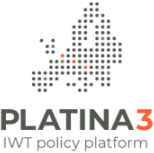Refresher classes greener vessel operation
Executive summary The Horizon 2020 project PLATINA3 provides a platform for the implementation of the NAIADES III action programme. PLATINA3 is structured around four fields (Market, Fleet, Jobs & Skills, Infrastructure) of which Work Package 3 (WP 3) deals with various aspects of the IWT training and careers topics, in particular: This report presents the conclusions from[…]

